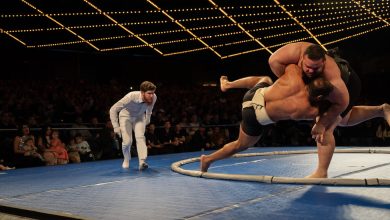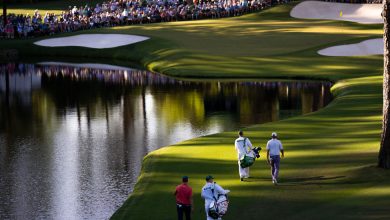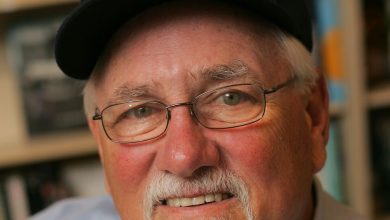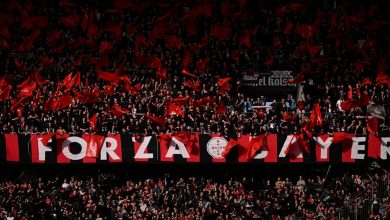Daniil Medvedev Loses a Match and No. 1 Ranking, but Faces Bigger Concerns

INDIAN WELLS, Calif. — Daniil Medvedev’s reign as the No. 1 men’s tennis player will not last long — at least, not this time.
Medvedev, a 26-year-old Russian, took over the top spot for the first time in his career last week from Novak Djokovic, but his third-round loss to Gael Monfils on Monday will allow Djokovic to reclaim the No. 1 ranking next week. Djokovic will ascend even though he was unable to play in the BNP Paribas Open because of the vaccination requirement for non-American visitors to the United States.
Medvedev, who is fully vaccinated against Covid-19, did make the journey to California, although some of his peers believe he also should not have been allowed to compete at Indian Wells because of Russia’s invasion of Ukraine.
Russian athletes have been banned from most international team competitions and some individual events, including World Cup competitions in biathlon and skiing and the recently concluded Beijing Winter Paralympics.
Marta Kostyuk, a rising Ukrainian star, said at Indian Wells that she did not think Russian tennis players like Medvedev should be allowed to compete. But after lengthy debate, tennis’s governing bodies have decided to preserve players’ right to compete individually as neutrals while banning Russia and Belarus, its ally, from team events like the Davis Cup and the Billie Jean King Cup.
Medvedev is grateful to keep his job, but all too aware that these are fluid, deeply sensitive circumstances. “First of all, it’s definitely not for me to decide,” he said. “I follow the rules. I cannot do anything else. Right now, the rule is that we can play under our neutral flag.”
But the war certainly changes the optics of matches like Monday’s.
Monfils, a Frenchman, recently married Elina Svitolina, Ukraine’s biggest tennis star, who was watching from his player box on Monday as the Ukrainian flag flapped in the breeze in its new place of honor atop the main stadium at the Indian Wells Tennis Garden. The flag was installed there this year next to the American one in a show of support for Ukraine.
Monfils, ranked No. 28 at age 35, said he did not view Monday’s match — or his surprising, 4-6, 6-3, 6-1, victory — through a political lens, but a personal one.
“I’m not very political in general,” he said in French. “I’m a support for my wife. A sad thing has come to her country. I try to do the maximum to support her in whatever she chooses to do, but today we were here for playing. I’m simply happy to have won my match.”
Monfils said that it had been difficult to see the distress of his Ukrainian in-laws.
“It’s not easy to see my wife a couple weeks ago crying every night,” he said in English. “Still quite a lot of family still there. It’s tough describe because I’m in it. And it’s just kind of crazy when you think about it, but we try to manage it the best way we can.”
Kostyuk, beaten in the second round here, said she was upset that more Russian players had not approached her to apologize directly for the invasion, but many of the Russian and Belarusian stars, including Medvedev, have called for peace. Victoria Azarenka of Belarus, a former world No. 1, said she had sought out Ukrainian players since the war began last month.
“Whatever I say I know can be twisted in many, many different ways,” she said. “But one thing that’s missing in this world is compassion toward each other and empathy. That’s something I feel I can offer to people.”
Medvedev’s short stint at No. 1 has not been business as usual. Reaching the top spot in the rankings is one of tennis’s ultimate achievements, and Medvedev is the first man outside the Big Four of Djokovic, Rafael Nadal, Roger Federer and Andy Murray to reign at No. 1 since early 2004.
In normal times, that would have been cause for fanfare. But these are traumatic times, and though the ATP Tour did award Medvedev the crystal trophy it reserves for first-time No. 1 players and hold a photo shoot with his support team, there was no media tour; no series of promotional events and interviews.
His management company, I.M.G., has said that no sponsors have dropped Medvedev since the war began, but this is not an appropriate climate for Medvedev to be searching for new international sponsors.
With the war, it is prudent for Russian stars to maintain a low profile. Speaking out against the war or President Vladimir V. Putin of Russia could carry risks for them and their relatives who are still in Russia or Belarus.
“I don’t think you should ask them to be more vocal about it, because they have family to consider, and now, you know, they can get 15 years in prison for talking about the war,” said Martina Navratilova, the former top-ranked player who defected in 1975 to the United States from Czechoslovakia when it was part of the Soviet bloc.
Russia-Ukraine War: Key Things to Know
Looking for a way out. Negotiators from both sides met again, as Russia expanded the targets of its military offensive and the humanitarian crisis deepened in Mariupol and other cities. But even the most basic progress towards diplomacy has proved elusive.
China’s strategy. China’s leadership, which dismissed U.S. allegations that Russia asked Beijing for military and economic aid, has calculated that they can benefit from the geopolitical shifts caused by the war by being seen as a pillar of stability in a turbulent world.
American journalist killed. Brent Renaud, an award-winning American filmmaker and journalist who drew attention to human suffering, was fatally shot while reporting in a suburb of Kyiv. Mr. Renaud, 50, had contributed to The New York Times in previous years, most recently in 2015.
Sergiy Stakhovsky, the recently retired Ukrainian men’s tennis player who has enlisted in the Ukrainian army, said this month on the Craig Shapiro Tennis Podcast that he believed that discontinuing the WTA and ATP tour events in Moscow but still allowing the Russian players to compete as neutrals was the right choice even though Putin uses sports to showcase Russia. Stakhovsky said Russian tennis players had achieved their success not with government support, but “thanks to themselves and their families,” adding that Medvedev, Andrey Rublev and Karen Khachanov, the leading Russian men’s players, were all based abroad.
“I’m pretty sure they didn’t even vote, so it’s really hard to put even a harder stance on them,” Stakhovsky said.
Navratilova, like tennis’s leaders, believes the decision to allow the Russians to play as neutrals was the right choice. Tennis has not barred players from specific nations from individual competition since the years after World War II, when Wimbledon and some other leading tournaments prohibited players from former enemy nations like Germany and Japan from taking part. Even during apartheid in South Africa, when the nation was barred from the Olympics and most other team competitions, its players were allowed to compete individually on tour.
“Of course, Ukrainians are the victims here, but the athletes of Belarus or Russia would be the victims on the other end if you don’t let them play,” Navratilova said.
Navratilova, who was born in 1956 in the Czechoslovak capital of Prague, remembers playing a Russian in a junior tournament there not long after the Soviet Union and other Warsaw Pact countries invaded in 1968 to suppress a democratic movement.
“I know it’s emotionally so difficult,” she said. “I was 13, almost 14. I wanted to beat this junior, and, in fact, when I shook her hand after I did, I said, ‘See, your tanks can’t beat us!’ So, I get that. You feel like you are playing for your country, and it hurts! And I knew she had nothing to do with it, but I still took it personally. So, I get where Kostyuk is coming from, how much it hurts, but I don’t think you can punish people to that level.”
Medvedev, who has been based in southern France or Monte Carlo since his early teens, said that in his view, “tennis is a very individual sport.”
He said that so long as he had the chance, “I’m going to be there to try to play for the fans, play for other people, for myself also, of course.”
But though both the men’s and women’s tours have reiterated their support for the current approach, Medvedev knows there are no guarantees. Though he has never played his finest tennis in the desert heat of Indian Wells, one also has to wonder how much the uncertainty and the war are impacting his state of mind or how much it might have impacted his tennis against Monfils on Monday, as Medvedev’s precise game collapsed in the final set amid a flurry of double faults and uncharacteristic errors.
“Let’s see how the situation evolves,” he said of permitting Russian athletes to compete.
Next stop: the Miami Open, where the men’s main draw begins March 23 and where, with Djokovic still not expected to play because of the travel ban, Medvedev can reclaim the No. 1 ranking by reaching the semifinals.
But that, at this stage, is not the biggest of his concerns.




